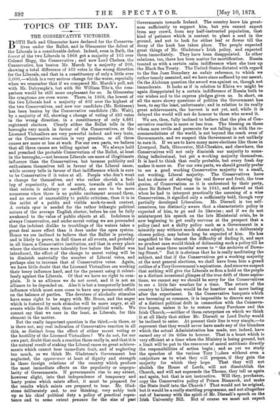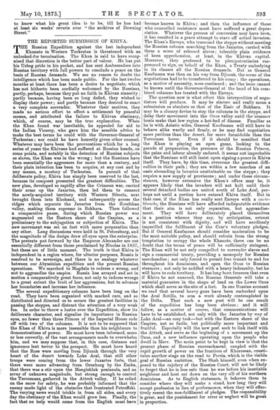TOPICS OF THE DAY.
THE CONSERVATIVE VICTORIES.
BOTH Bath and Gloucester have declared for the Conserva- tives under the Ballot, and in Gloucester the defeat of the Liberals is a considerable defeat. Indeed, even in Bath, the lowest of the two Liberals in 1868 got a majority of 163 over Colonel Hogg, the Conservative ; and now Lord Chelsea, the Conservative, has beaten Mr. Murch by a majority of 260, showing a total difference of 463 votes in the wrong direction for the Liberals, and that in a constituency of only a little over 5,000,—which is a very serious change for the worse, especially when we remember that if we compared Mr. Murch's poll, not with Mr. Dalrymple's, but with Sir William Tite's, the com- parison would be still more unpleasant for us. In Gloucester the symptoms are even worse. There, in 1868, the lowest of the two Liberals had a majority of 402 over the highest of the two Conservatives, and now our candidate (Mr. Robinson) has been beaten by the Conservative candidate (Mr. Wait), by a majority of 83, showing a change of voting of 485 votes in the wrong direction, in a constituency of only 4,681 registered electors. Clearly either the Ballot tells in the boroughs very much in favour of the Conservatives, or the Licensed Victuallers are very powerful indeed and very irate, or the Conservative reaction is very genuine, or all three causes are more or less at work. For our own parts, we believe that all three causes are telling against us. We always held and preached the probable Conservatism of the Ballot, at least in the boroughs,—not because Liberals use more of illegitimate influence than the Conservatives, but because publicity and enthusiasm themselves tell in favour of the Liberal cause, while secrecy tells in favour of that indifference which is sure to be Conservative if it votes at all. People who don't want a change for themselves, and who rather cherish a feel- ing of superiority, if not of scorn, towards all who hold that reform is salutary or needful, are sure to be more numerous when there is no public excitement around them, and no sense of amenability to public criticism, than it is in the midst of a public and visible neck-to-neck contest. A certain spur is needed for the rather lethargic political nature of the average English elector, before he can be fully awakened to the value of public objects at all. Indolence is always Conservative, and under secret voting we are persuaded that the indolent dislike to troublings of the waters takes a great deal more effect than it does under the open system. Hence we are inclined to believe that the Ballot is proving, and is likely to prove, in dull times at all events, and probably in all times, a Conservative institution, and that in every place where the elections were tolerably free before the Ballot was introduced, the effect of the change to secret voting will be to diminish materially the number of Liberal votes, and perhaps also to increase that of Conservative votes. Again, we have little doubt that the Licensed Victuallers are working their beery influence hard, and for the present using it relent- lessly against the Liberals. Of that we have no right to com- plain. It is an alliance we do not covet, and it is not an alliance to be depended on. Also it is but a temporarily hostile influence which must soon cease to have any permanent effect on the balance of parties. The devotees of alcoholic stimulus have some right to be angry with Mr. Bruce, and the anger which is fostered by such stimulus will be more angry, at all events while the fit lasts, than ordinary political wrath. We cannot say that we care in the least, as Liberals, for this element in the matter.
But the really important question is the third,—is there, or is there not, any real indication of Conservative reaction in all this, as distinct from the effect of either secret voting or the hostility of the Licensed Victuallers ? We do not, for our own part, doubt that such a reaction there really is, and that it is the natural result of staking the Liberal cause on great achieve- ments which cannot bear immediate fruit, and of neglecting too much, as we think Mr. Gladstone's Government has neglected, the appearance at least of dignity and strength in those foreign relations of the country which produce the most immediate effects on the popularity or unpopu- larity of Governments. If governments rise to any extent, however slight, into that independence of temporary and hasty praise which saints affect, it must be prepared for the results which saints are prepared to bear. Mr. Glad- stone deliberately and, to our thinking, very nobly took up as his chief political duty a policy of practical repen- tance and to some extent penance for the sins of past Governments towards Ireland. The country knew his great- ness sufficiently to support him, but you cannot expect from any crowd, from any half-instructed population, that kind of patience which is content to plant a seed in the ground, and not to look for either leaf or flower till the decay of the husk has taken place. The people expected great things of Mr. Gladstone's Irish policy, and expected them immediately. They have been disappointed. In other relations, too, there has been matter for mortification. Russia treated us with a certain calm indifference when she tore up the Black Sea Treaty. The United States dictated with regard to the San Juan Boundary an unfair reference, to which we rather tamely assented, and we have since suffered by our assent. On the Alabama question the award was against us, though not immoderate. It looks as if in relation to Khiva we might be again disappointed by a certain indifference of Russia both to our wishes and to the express pledges given us. In short, on all the more showy questions of politics the Government has been, to say the least, unfortunate; and in relation to its really great achievements, the harvest is not yet, and, while it is delayed the world will not do honour to those who sowed it.
We are, then, fully inclined to believe that the plea of Con- servative reaction is more or less true. The blessing on those whom men revile and persecute for not falling in with the re- commendations of the world, is not beyond the reach even of Governments, and we suspect this Government is not unlikely to earn it. If we are to have many more elections like those in Liverpool, Bath, Gloucester, Mid-Cheshire, and elsewhere, the Conservatives will not only diminish our majority to some- thing infinitesimal, but get a working majority themselves. It is hard to think that really probable, but every fresh day makes it more so. For our own parts, we should greatly prefer to see a good working Conservative majority to a small, not working, Liberal majority. The Conservatives have had no chance of showing the real flower and fruit, the true genius, of Conservatism as it is understood by their party, since Sir Robert Peel came in in 1841, and showed us that when he had to interpret practically the meaning of a wise Conservatism, it signified only a sufficiently bold, though very partially developed Liberalism. Mr. Disraeli is too self- conscious, too distinctly aware that a characteristic policy is expected of him, to go and do likewise ; and if we do not misinterpret his speech on the late Ministerial crisis, he is now beginning to get really nervous at the prospect that a policy (and not a shifty policy such as a Government in a minority may without much shame adopt), but a deliberately chosen policy, may before long be expected of him. He has magnified to the utmost the difficulty of finding it, and says no prudent man would think of delineating such a policy till he had had some three months' access to "the archives of Down- ing Street." But it is obvious that he is really meditating the subject, and that if the Conservatives get a working majority at the next general elections, we shall have from him a grand outline of a Tory Government's aspirations. And since we suspect that nothing will give the Liberals so firm a hold on the people as a distinct Occasional glimpse of the true drift of these aspira- tions, we cannot say we should be sorry for the Conservatives to see a little fair weather for a time. The return of the country to Liberalism would be far heartier and more lasting after the experiment. In the Conservative banquets which are becoming so common, it is impossible to discern any trace of a distinct political drift in connection with the Conserva- tive hopes, unless it be to restore Army Purchase and the Irish Church,—neither of them enterprises on which we think it at all likely that either Mr. Disraeli or Lord Derby would be inclined to enter. At present their line is very simple,—to represent that they would never have made any of the blunders which the actual Administration has made, nor, indeed, have earned any of its titles to honour. That is a boast which is very efficient at a time when the Ministry is losing ground, but a limit will be put to the resources of moral antithesis directly the responsibilities of action begin ; and as yet we study the speeches of the various Tory 1:ders without even a conjecture as to what they will propose, if they gain the majority for which they hope. That they will not abolish the House of Lords, will not disestablish the Church, and will not supersede the Throne, they tell us again and again, but that is not instructive. Will they, perchance, copy the Conservative policy of Prince Bismarck, and make the State itself into the Church ? That would not be original, but it would be a really startling programme, and not altogether out of harmony with the spirit of Mr. Disraeli's speech on the Irish University Bill. But of course we must not expect



































 Previous page
Previous page